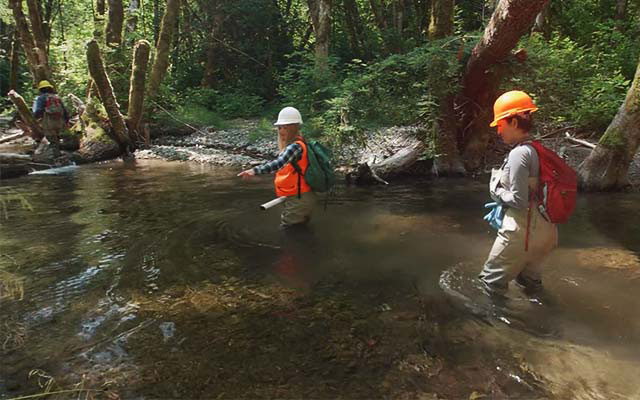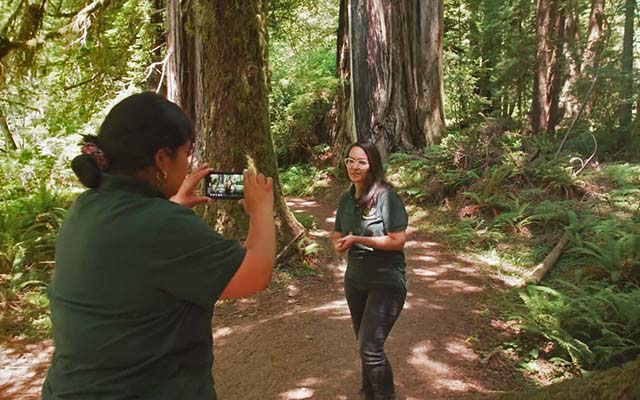
Humboldt State is surrounded by world-famous, ancient redwood forests that bear deep scars from decades of industrial logging. Thanks to Redwoods Rising—a collaborative program that aims to restore more than 70,000 acres of previously logged forest in Redwood National and State Parks—HSU and the College of the Redwood (CR) students are working with Save the Redwoods League, the National Park Service, and California State Parks to restore the ecological diversity of the world’s tallest forests while gaining practical research experience.
Widespread commercial logging in the redwood region began in the 19th century, and though sustainable forestry practices have improved dramatically, about 95% of old-growth coastal redwood forests have been logged. Today, Redwood National and State Parks are home to almost half of the world’s remaining protected ancient old-growth redwood forests. However, among the 120,000 acres of forest managed by Redwood National and State Parks, more than two-thirds have been impacted by historical logging and road-building.
HSU’s Department of Forestry has a long history of working closely with the parks and Save the Redwoods League, a nonprofit organization founded in 1917 to protect and restore California’s redwoods. When Redwoods Rising launched in 2018, the partners prioritized training the next generation of conservation leaders by providing hands-on experience and career development opportunities with real, lasting ecological benefits for the redwoods. Hiring student apprentices from HSU and CR was a natural fit.
“Redwoods Rising is ideal for go-getters who are looking for direct experience in the field,” explains HSU Forestry Professor Erin Kelly. “While many students come from natural resource science majors, other apprentices have come from varied backgrounds and disciplines. We’ve really put a priority on recruiting across the University and CR.”
Kelly oversees the hiring, staffing, transportation, and logistics of the apprenticeship program along with fellow Forestry Professor Lucy Kerhoulas. With four successful seasons under their belt, the program is already well-known and attracts a large pool of applicants each year. Redwoods Rising apprentices are paid and work full time during the summer.
Judson Fisher is a senior Forestry major who apprenticed with Redwoods Rising in 2019 and 2020. “The first-hand experience I gained while working with multiple agencies on a large, collaborative restoration project will definitely be an asset in my future,” says Fisher, who plans to continue his education in a restoration-focused graduate program after graduating from HSU this fall. “During my apprenticeship, I was able to explore remote parts of Redwood State and National parks while ensuring that sensitive riparian areas were adequately protected.”
While Redwoods Rising is a relatively new program, Kerhoulas says that roughly 20% of their students have gone on to land jobs at Redwood National and State Parks. “This program offers a valuable pipeline from HSU to employment with the state and national parks,” says Kerhoulas.
With the parks undertaking massive restoration projects across the region, the type of roles available for Redwoods Rising apprentices is varied, and includes work assignments in botany, forestry, hydrology, watershed rehabilitation, and wildlife management. Additionally, Kerhoulas and Kelly have focused on student diversity, fielding applicants from across the University.
“Last season, we hired several bilingual students for interpretation who were tasked with explaining what’s happening ecologically in the forest to a broad audience. It’s challenging and essential work,” says Kelly.

Kelly and Kerhoulas explain that equity is an essential piece as well. Unpaid internships are far too common in the natural sciences, giving students who can choose opportunity over income a leg-up on competition for future jobs. As Redwoods Risings pays student apprentices, many have returned for a second season of work and play a key role in recruiting and training other student apprentices.
“We’ve also had several student-parents complete the program,” says Kelly. “It’s really important that these valuable learning experiences are available to everyone.”
Kelly describes another priceless benefit of the Redwoods Rising apprentice program: Experiencing the forest through a unique lens and building the lasting camaraderie that comes from camping and working together all summer long.
“It’s really incredible how knowledgeable and confident our students come back after a summer with Redwoods Rising,” says Kelly. “They are experiencing active forest restoration in real-time.”